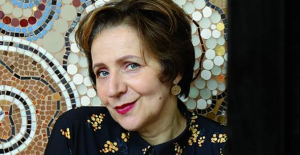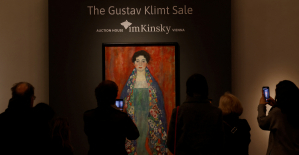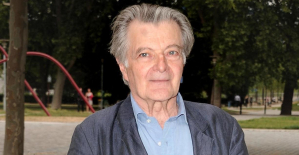Former Federal Minister of Agriculture and Secretary of Defense Christian Schmidt (CSU) has been the High Representative of the international community in Bosnia-Herzegovina since August 2021. We can reach him by telephone in his office in Sarajevo.
WORLD: The EU Commission recommends granting Bosnia-Herzegovina the status of a candidate country and refers to “surprisingly far-reaching progress” as justification. Do you see any?
Christian Schmidt: Important progress has been made in the fight against corruption by adapting public procurement law to European standards. There is also a draft law that will strengthen the independence of the judiciary. This is an important step towards the rule of law. And the country is lifting a deadlock that has prevented it from appointing new judges in recent years.
WORLD: The report also states that not all 14 reform priorities have been met. What is the biggest hurdle to gaining candidate status?
Schmidt: The biggest hurdle comes after candidate status has been granted. When it comes to eliminating obvious discrimination in the country. At present, according to the constitution in Bosnia-Herzegovina, only a Croat, a Serb or a Bosniak can become president. Jewish fellow citizens, for example, are not even allowed to run for office. Years ago, the European Court of Human Rights called for this to finally change.
WORLD: Where do you see other deficits?
Schmidt: Very practical, for example in the field of education. The curricula for the children and young people differ depending on their ethnicity. There needs to be standardization. Brussels can't dictate that, but it would help unite the country internally.
WORLD: Bosnia-Herzegovina is a fragile entity with three presidents, three parliaments and two entities - the Croatian-Muslim Federation and the Bosnian-Serbian Republic of Srpska. What does candidate status mean for the country?
Schmidt: The coexistence of Croats, Serbs and Bosniaks is sometimes difficult, even 27 years after the end of the war. The people here in Sarajevo in particular still have three years of siege in their bones. There is great distrust in their own politicians. And also the concern that Western Europe is not really interested in Bosnia-Herzegovina. A concern that has only increased after the Russian attack on Ukraine. People wonder if they could also become someone's prey. Candidate status will give them a sense of security.
WORLD: So far, the federal government has always taken the position that the only way to Europe is through internal unification. Is that still valid?
Schmidt: There are, in fact, extreme nationalist positions – which, to varying degrees, affect both Croatian and Serbian nationalist-political representatives of the population groups. The threat of secession resonates again and again. But the message is clear, and the international community agrees: the only way to Europe is together. My job is to protect the integrity of the country.
WORLD: What role does Germany play in the accession process?
Schmidt: Bosnia-Herzegovina is extremely pro-Germany. People have not forgotten that they were taken in as refugees in Germany during the Bosnian war. Ultimately, I also benefit from this in my office.
WORLD: What can and do you want to do in your office towards candidate status and the accession process?
Schmidt: I see myself as a kind of auxiliary force in the country's European integration. My mandate from the Dayton Agreement (which ended the war in 1995 mediated by the USA and the EU, as a rule) enables me to enact laws – which I have only used and will only do in exceptional cases. For example, I strengthened the independence of the electoral commission. Which, after the elections earlier this month, has meant that some districts where there are obvious discrepancies are now counting the ballots again. This also contributes to the rule of law.
WORLD: How big is Russia's influence in the region? Would candidate status change that?
Schmidt: I would describe the influence as diffuse. The young, dynamic generation is orientated towards Europe, wants and goes to Europe because they see no prospects in their homeland. Incidentally, this also applies to the people in the Republic of Srpska, who want to go west and not east. Candidate status could help change that and encourage people to stay.
WORLD: How do you see the chances that the EU heads of state and government will grant Bosnia-Herzegovina candidate status?
Schmidt: Bosnia-Herzegovina was promised EU membership as early as 2003, and the official application was made in 2016. The country was once seen as a front runner in implementing European principles. But the willingness of the political class to reform has waned. The mentality prevails that the EU will fix it. In some EU member states there are therefore still reservations about granting candidate status. But overall I'm very hopeful.

 His body naturally produces alcohol, he is acquitted after a drunk driving conviction
His body naturally produces alcohol, he is acquitted after a drunk driving conviction Who is David Pecker, the first key witness in Donald Trump's trial?
Who is David Pecker, the first key witness in Donald Trump's trial? What does the law on the expulsion of migrants to Rwanda adopted by the British Parliament contain?
What does the law on the expulsion of migrants to Rwanda adopted by the British Parliament contain? The shadow of Chinese espionage hangs over Westminster
The shadow of Chinese espionage hangs over Westminster Parvovirus alert, the “fifth disease” of children which has already caused the death of five babies in 2024
Parvovirus alert, the “fifth disease” of children which has already caused the death of five babies in 2024 Colorectal cancer: what to watch out for in those under 50
Colorectal cancer: what to watch out for in those under 50 H5N1 virus: traces detected in pasteurized milk in the United States
H5N1 virus: traces detected in pasteurized milk in the United States What High Blood Pressure Does to Your Body (And Why It Should Be Treated)
What High Blood Pressure Does to Your Body (And Why It Should Be Treated) “I’m interested in knowing where the money that the State takes from me goes”: Bruno Le Maire’s strange pay slip sparks controversy
“I’m interested in knowing where the money that the State takes from me goes”: Bruno Le Maire’s strange pay slip sparks controversy Despite the lifting of the controllers' strike, massive flight cancellations planned for Thursday, April 25
Despite the lifting of the controllers' strike, massive flight cancellations planned for Thursday, April 25 The right deplores a “dismal agreement” on the end of careers at the SNCF
The right deplores a “dismal agreement” on the end of careers at the SNCF The United States pushes TikTok towards the exit
The United States pushes TikTok towards the exit Saturday is independent bookstore celebration
Saturday is independent bookstore celebration In Paris as in Marseille, the Flames ceremony opens to fans of rap and hip-hop
In Paris as in Marseille, the Flames ceremony opens to fans of rap and hip-hop Sale of the century for a mysterious painting by Klimt, in Austria
Sale of the century for a mysterious painting by Klimt, in Austria Philippe Laudenbach, actor with more than a hundred supporting roles, died at 88
Philippe Laudenbach, actor with more than a hundred supporting roles, died at 88 Skoda Kodiaq 2024: a 'beast' plug-in hybrid SUV
Skoda Kodiaq 2024: a 'beast' plug-in hybrid SUV Tesla launches a new Model Y with 600 km of autonomy at a "more accessible price"
Tesla launches a new Model Y with 600 km of autonomy at a "more accessible price" The 10 best-selling cars in March 2024 in Spain: sales fall due to Easter
The 10 best-selling cars in March 2024 in Spain: sales fall due to Easter A private jet company buys more than 100 flying cars
A private jet company buys more than 100 flying cars This is how housing prices have changed in Spain in the last decade
This is how housing prices have changed in Spain in the last decade The home mortgage firm drops 10% in January and interest soars to 3.46%
The home mortgage firm drops 10% in January and interest soars to 3.46% The jewel of the Rocío de Nagüeles urbanization: a dream villa in Marbella
The jewel of the Rocío de Nagüeles urbanization: a dream villa in Marbella Rental prices grow by 7.3% in February: where does it go up and where does it go down?
Rental prices grow by 7.3% in February: where does it go up and where does it go down? Sale of Biogaran: The Republicans write to Emmanuel Macron
Sale of Biogaran: The Republicans write to Emmanuel Macron Europeans: “All those who claim that we don’t need Europe are liars”, criticizes Bayrou
Europeans: “All those who claim that we don’t need Europe are liars”, criticizes Bayrou With the promise of a “real burst of authority”, Gabriel Attal provokes the ire of the opposition
With the promise of a “real burst of authority”, Gabriel Attal provokes the ire of the opposition Europeans: the schedule of debates to follow between now and June 9
Europeans: the schedule of debates to follow between now and June 9 These French cities that will boycott the World Cup in Qatar
These French cities that will boycott the World Cup in Qatar Montpellier-Nantes: at what time and on which channel to watch the Ligue 1 match?
Montpellier-Nantes: at what time and on which channel to watch the Ligue 1 match? Ligue 1: Luis Enrique leaves many PSG players to rest in Lorient
Ligue 1: Luis Enrique leaves many PSG players to rest in Lorient Football: Deschamps, Drogba, Desailly... Beautiful people with Emmanuel Macron to play with the Variétés
Football: Deschamps, Drogba, Desailly... Beautiful people with Emmanuel Macron to play with the Variétés Football: “the referee was bought”, Guy Roux’s anecdote about a European Cup match… with watches and rubies
Football: “the referee was bought”, Guy Roux’s anecdote about a European Cup match… with watches and rubies


















